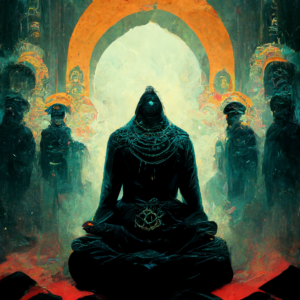In Alan Chapman’s Magia, there’s something called ‘the silent knowing’. In this article I want to tackle what I think it is, how it has gone by many other names over the years and why attuning to it leads to a lessening, or possible freedom, from suffering.
Now, let’s make sure we’re clear on some terms here. We often see the word ‘suffering’ proliferated about willy-nilly in spirituality circles and it kind of comes from a not-so-great translation of the Buddhist term ‘dukkha’. As I’ve written previously, dukkha was a word used for when something wasn’t running properly and the example usually given is for when a cartwheel isn’t running properly on a horse cart/chariot; so while it’s not the suffering we think of when we see images of famine, drought, genocide on our televisions, it’s more like a consistent unpleasantness, or, a better term, unsatisfactory-ness, which is a mouthful yes, but it’s better than the hero/victim-inducing term ‘suffering’.
 It’s almost a kind of badge of honor to suffer isn’t it? We all try to out-do each other with how much we have to seemingly endure. If you don’t believe me then try this; next time you meet someone tell them you’re tired lately, very quickly they’ll try to one-up up and they’ll tell you how more-tired they are than you and why. Now, this can be seen in three ways, they want to both identify with your plight and want you to identify with their’s in some kind of very strange, unconscious way of building a wee community together. Or, in a third way; some sense of inferiority is making itself known but they inflate it and try and out-do you. People are weird man. But, all-in-all, as is my favorite topic of late, it’s pretty easy to see the hero/victim archetype(s) playing out here.
It’s almost a kind of badge of honor to suffer isn’t it? We all try to out-do each other with how much we have to seemingly endure. If you don’t believe me then try this; next time you meet someone tell them you’re tired lately, very quickly they’ll try to one-up up and they’ll tell you how more-tired they are than you and why. Now, this can be seen in three ways, they want to both identify with your plight and want you to identify with their’s in some kind of very strange, unconscious way of building a wee community together. Or, in a third way; some sense of inferiority is making itself known but they inflate it and try and out-do you. People are weird man. But, all-in-all, as is my favorite topic of late, it’s pretty easy to see the hero/victim archetype(s) playing out here.
There is obviously genuine suffering in the world, of course there is, but I really need to stress here that the freedom, or possible, freedom from ‘suffering’ or unsatisfactory-ness is more about being able to see things for what they are and thus not falling into previously-held behaviours (based on past experiences/biases etc.) when they come along. Just because a stranger called you a c*nt yesterday and you shouted at her angrily in response doesn’t mean you have to shout at the person who called you a c*nt today. Although, if you were being called a c*nt twice in two days by strangers you might either want to change jobs or, y’know, stop being a c*nt, if you’re being one.
While I’m kind of taking the mickey here, I do however, want you dear reader to understand the point that by practicing mediation and virtuous behavior we learn to deal with life’s small and large problems better. We pick up on behaviors for no other reason than we’ve seen others behave in a certain way or we’ve previously behaved in a certain way and have bought into the idea that this is the correct way to act when really it just seems to lead to more dukkha/unsatisfactory-ness. We need to slam on the breaks then and try to bring an end to this as it just leads to the same thing over and over and over and over again and again and again.
So then, what is this ‘silent knowing’ Well, you know that feeling that you can’t really name that tells you that something is off. That’s it; intuition. But it’s also something greater. It’s like a feeling or an intuition that all is not as it seems in this world, there is something greater and we are both a part of it and it a part of us and we long for connecting with it.
And even after connection is made and nurtured then that becomes a longing to be at one with it; call it god, call it love, call it the universe or the cosmos, names don’t always matter but you get the meaning. The ‘silent knowing’ then is the soul-call, the inner life within our bodies and minds that asks to be united to where it comes from. Not much of an ask…is it?
Comparing and contrasting in spirituality/the occult isn’t always the best way to go about things, you end up with absolute quackery like Liber 777 which connect things like the color purple to all of the the following; Mercury (planet and god), quicksilver (yes, I know it’s also called mercury), the astrological sign Leo, Jupiter (planet and god), water, another astrological; Aquarius and meditation. Correspondences are pretty meaningless until we give them our own meaning and taking the meaning’s of others as gospel-truth is one of the many roads to hell. Make up you own mind, don’t even listen to me. I just can’t resist sticking a boot in where Crowley’s involved, call it a shadow if you want, I don’t know. He did get some things right though, as we’ll see further down.
Regardless, this idea of the silent knowing is old, very, very old. Recently, I picked up Marcus Aurelius’ Mediations and something jumped out at me:
It’s time you realized that you have something in you more powerful and miraculous than the things that affect you and make you dance like a puppet.
We are obviously reactive beings, we have to be and praise all the many and various gods for that ability, imagine being a robot, no thanks, but it’s a simple fact that we react to the world around us and what makes us react in the ways that we do are the biases and prejudices we have in our noggins. And we know this behavior is wrong but we still do it as we live, asleep at the wheel but it’s the thing inside of us; the soul, that’s greater and points us at being better humans to both ourselves and the wider world.
Aurelius was, of course, a Stoic philosopher and Roman Emperor too and those lads were big into something called ‘the logos’, the Stoics that is, the people of the Roman Empire less so, although it was quite the fad for a while. An earlier philosopher, Plutarch, a Platonist, said that the logos was ‘the go-between’ between god and man.
The logos is defined by the good people at encyclopedia.com as:
A principle originating in classical Greek thought which refers to a universal divine reason, immanent in nature, yet transcending all oppositions and imperfections in the cosmos and humanity. An eternal and unchanging truth present from the time of creation, available to every individual who seeks it.
This would certainly fit with my thoughts on what the silent knowing is.
There’s also the idea of Socrates’s daemon, which is the belief of the divine within us all who guides us on our journey ‘home’. Interestingly, the chap we mentioned above, Plutarch in his Moralia, wrote about Socrates’ daemon in something called De genio Socratis. This daemon, many will argue, is the our inner ‘god’ which is part of the higher big-g God. Indeed there’s a quote from the aforementioned Chapman regarding what this daemon is as:
A dualistic representation of the non-dual.
Of course, this entity has become commonly known as the Holy Guardian Angel in the Western spirituality tradition but it’s a wider subject for another day. But we can ask, is it the same thing? I would have to argue that it is, after all if our soul is guiding us and hinting to us that there’s something greater ‘out there’ (and, indeed, ‘in here’) and is trying to guide us to live a life where we can deal successfully with what comes up and not to live a life of constant unsatisfactory-ness then it is the same thing as the logos and the silent knowing.
In Eastern philosophy there isn’t really the idea of an entity who will guide you ‘home’, although there are some but none that are individualized, however there is, of course the idea of Dharma in Hinduism, Buddhism, Sikhism and Jainism and they more or less mean the same across the four; living morally and purely as fully realised humans.
Of course, to do this you must study the sacred scriptures and meditate like hell but again, like the soul-call mentioned above, it’s all about realising the inner, perfected being within us and being one with it. Where Buddhism and Hinduism differ is that for Buddhists there is no-self while for the Hindus there is one-self that we are all a part of (I’m on that train).
 So if all those ideas point to the same thing then how do we nurture the ‘silent knowing’? In Magia there are three meditation practices, which you can learn about here, here and here. In Hindu terms a practice to follow would be Bhakti Yoga, where you devote yourself to a god or the highest god, Krishna who in the Bhagavad-Gita reveals to Arjuna that all gods are him anyway. So, if you were doing it in the case of the silent knowing/logos/soul-call you would be devoting yourself to the inner-god within. To bring it back to another Western system, in Crowley’s AA, one part of an oath you take as a practitioner in the higher grades states:
So if all those ideas point to the same thing then how do we nurture the ‘silent knowing’? In Magia there are three meditation practices, which you can learn about here, here and here. In Hindu terms a practice to follow would be Bhakti Yoga, where you devote yourself to a god or the highest god, Krishna who in the Bhagavad-Gita reveals to Arjuna that all gods are him anyway. So, if you were doing it in the case of the silent knowing/logos/soul-call you would be devoting yourself to the inner-god within. To bring it back to another Western system, in Crowley’s AA, one part of an oath you take as a practitioner in the higher grades states:
I will interpret every phenomenon as a particular dealing of God with my soul.
Bhakti also exists in Buddhism, where people dedicate offerings and group prayer/mantras to the Buddha, the Bodhisattvas and/or some of the wrathful deities too (depending on your brand of Buddhism).
That’s it then from me, I just wanted to explore this idea a bit and show a few different versions of what points at the same thing; that there are world-wide practices and a thread going back from now into the ancient past regarding learning to know and trust and nurture our inner-selves.